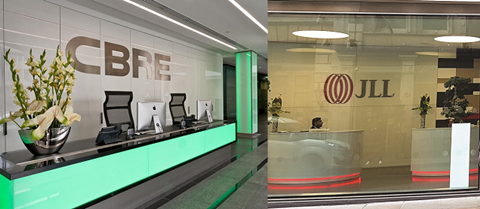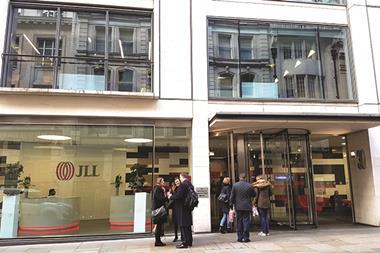The gap between the underlying profits of CBRE’s business in Europe, the Middle East and Africa (EMEA) and those of JLL has widened by $175m (£126m) in just two years.

Back in 2015, before Guy Grainger became JLL’s chief executive of EMEA, the firm’s adjusted EBITDA in EMEA stood at $173m, just $32.2m behind CBRE’s $205.2m for the same year.
Annual accounts for 2017 published last week show that the gap has now ballooned to $206.8m. Since 2015, JLL’s adjusted EBITDA has slumped almost 43% to $98.9m, while CBRE has increased its earnings by 49% to £305.7m. This is despite the fact that JLL grew its EMEA revenues slightly faster than CBRE did over the same period, increasing them by 43% to $2.6bn, while CBRE grew its top line by 39% to $4.2bn.
The decline in profitability at JLL has had a knock-on effect on the wider business. Over the past two years, JLL has increased global adjusted EBITDA by just 1.47% despite strong profit growth in the Americas and Asia-Pacific regions. By contrast, global earnings for CBRE have rocketed more than 21%.
Integral costs
JLL blamed the weak profit figures in EMEA in 2017 on the cost of integrating Integral, which it acquired for $330m in June 2016, and $20m in contract losses at the facilities management business.
Last year, it said 2016’s decline in profitability was primarily UK focused and driven by a fall in transaction volumes following the Brexit vote. While he refused to take questions directly from Property Week, Chris Ireland, chief executive of JLL UK, did provide a written statement claiming the UK business bounced back in 2017.
“Our UK business is making strong progress against our strategic plan,” he said. “We’ve seen incredibly strong performance in our capital markets, alternatives, residential and leasing businesses in the UK. Our UK revenues and margin are up, and at the same time Integral is being integrated into JLL’s wider integrated facilities management proposition across EMEA.”
Jason Weaver, a New York-based analyst at Wedbush Securities, said the integration of Integral into JLL was taking longer than expected.
“The Integral acquisition was huge,” he said. “Some people hold the notion that they overpaid, but it’s that the timeline has dragged on and on that has, for me, impacted EMEA more.”
JLL refused to comment on how much longer the Integral acquisition would affect EMEA earnings. However, in an analyst call following the annual results, JLL’s global chief financial officer Christie Kelly said: “I think from the perspective of EMEA, we don’t give guidance. But if you can imagine, the team’s working really hard to integrate and realise the benefits of the Integral acquisition. That’s going to be ongoing throughout 2018.”
Under pressure
The business faces other challenges. Weaver predicted that Cushman & Wakefield could soon take JLL’s number-two spot in the global real estate agency league tables.
“Cushman would likely leapfrog JLL, yes,” he said. “I expect it’ll be more aggressive on recruitment and acquisitions than JLL and would take that number-two spot.”
While Cushman & Wakefield is recruiting aggressively, JLL has suffered a number of senior managerial losses in the UK over the past two years.
The staff losses, which have hit the retail division particularly hard, have led some within the firm to question the management’s ability to keep staff morale high, especially in the Warwick Street head office in London’s West End.
One recent senior-level departee, who would only speak on the condition of anonymity, said: “There is a bad atmosphere around the building. If there’s an opportunity to leave JLL, then staff are taking it.
“I can’t speak for staff around the EMEA region, but certainly in the UK there’s a downbeat feeling. Some are hoping Chris [Ireland] will step aside for Alistair Meadows [JLL’s head of capital markets]. It’s no secret internally that he’s being groomed as the next UK boss.”
Asked whether Meadows was being considered as Ireland’s eventual replacement, JLL again refused to comment.



























![Rob J Headshot[14]](https://d2bq2usf2vwncx.cloudfront.net/Pictures/380x253/8/5/5/1884855_robjheadshot14_607979_crop.jpg)


No comments yet